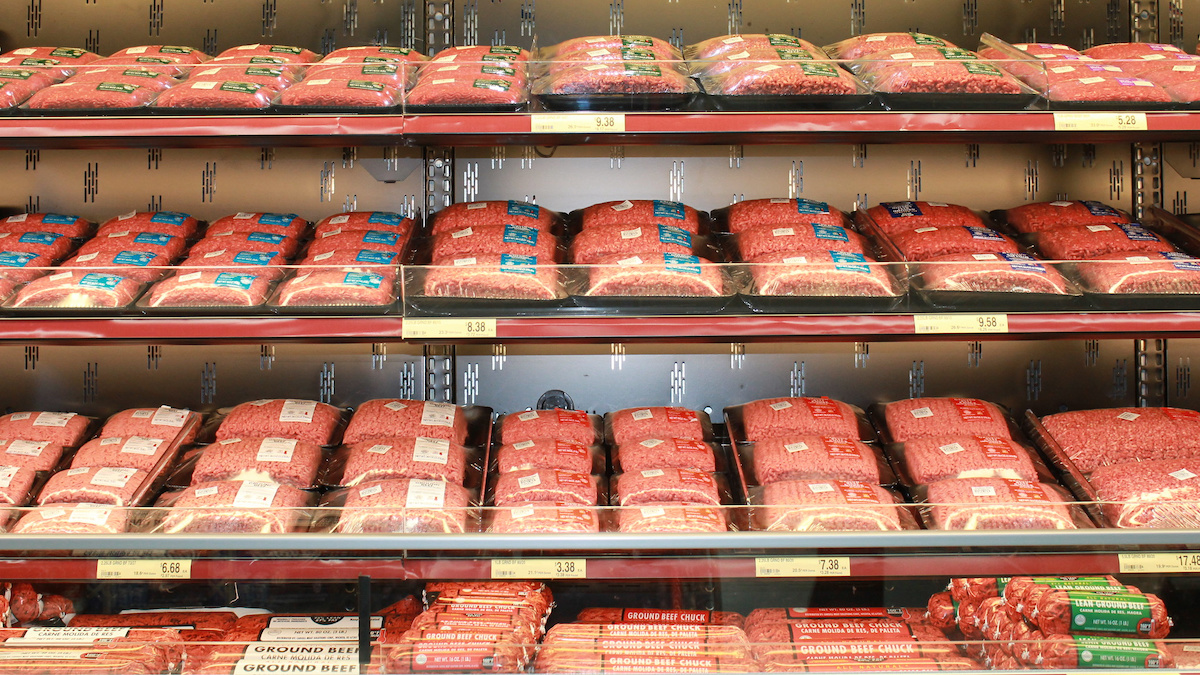
Nearly 43,000 Pounds of Ground Beef Recalled Over E. Coli Fears

Ground beef on sale at Walmart, one of the stores impacted by a nationwide recall, in Marietta, Georgia on Jan. 16, 2013. Photo courtesy of the city of Marietta
New Jersey-based Lakeside Refrigerated Services is recalling nearly 43,000 pounds of ground beef that may be contaminated with E. coli.
The beef was sold at Walmart, among other grocery stores, Business Insider reported. The U.S. Department of Agriculture (USDA) Food Safety and Inspection Service (FSIS) announced the recall Saturday. It comes as the coronavirus pandemic has raised concerns about the national meat supply and sickened food safety inspection workers.
“FSIS is concerned that some product may be in consumers’ refrigerators or freezers,” the agency wrote. “Consumers who have purchased these products are urged not to consume them. These products should be thrown away or returned to the place of purchase.”
#Recall: Lakeside Refrigerated Services Recalls Beef Products due to Possible E.coli O157:H7 Contamination https://t.co/NkQ9MiBqjC
— USDA Food Safety & Inspection Service (@USDAFoodSafety) June 14, 2020
The recalled beef was produced June 1 and has an establishment number of “EST. 46841.” Approximately 42,922 pounds of beef were affected. Impacted brands include Marketside Butcher and Thomas Farms, and the products were shipped to grocery stores across the country including Walmart.
“As soon as we were notified by Thomas Foods of the recall, we immediately began the process of alerting our stores and distribution centers to remove the affected product from our store shelves and inventory, including a sales restriction,” the retail chain said in a statement reported by Business Insider. “Customers who have purchased the items identified in the recall should dispose of the product and return to their nearest Walmart for a full refund.”
FSIS provided a detailed list of the recalled products:
1-lb. vacuum packages containing “MARKETSIDE BUTCHER ORGANIC GRASS-FED GROUND BEEF” and a use or freeze by date of 07/01/20 and lot code P53298-82.
1-lb. vacuum packages containing four ¼ lb. pieces of “MARKETSIDE BUTCHER ORGANIC GRASS-FED GROUND BEEF PATTIES” and a use or freeze by date of 06/27/20 and lot code P53934-28.
3-lb. vacuum packages containing three 1 lb. pieces of “MARKETSIDE BUTCHER ORGANIC GRASS-FED GROUND BEEF 93% LEAN / 7% FAT” and a use or freeze by date of 07/01/20 and lot code P53929-70.
1-lb. tray packages containing four ¼ lb. pieces of “THOMAS FARMS GRASS-FED GROUND BEEF PATTIES 85% LEAN / 15% FAT” and a use or freeze by date of 06/25/20 and lot code P53944-10.
4-lb. tray packages containing 10 ¼ lb. pieces of “THOMAS FARMS GRASS-FED GROUND BEEF PATTIES 80% LEAN / 20% FAT” and a use or freeze by date of 06/25/20 and lot code P53937-45.
1-lb. vacuum packages containing four ¼ lb. pieces of “THOMAS FARMS GRASS-FED GROUND BEEF PATTIES 85% LEAN / 15% FAT” and a use or freeze by date of 06/27/20 and lot code P53935-25.
1-lb. vacuum packages containing “VALUE PACK FRESH GROUND BEEF 76% LEAN / 24% FAT” and a use or freeze by date of 07/01/20 and lot code P53930-18.
The potential contamination was discovered during a routine FSIS inspection and there have been no confirmed cases of anyone falling ill from eating the product.
Most people infected with E. coli O157:H7, the particular strain identified, fall ill two to eight days after eating contaminated food. Symptoms include dehydration, bloody diarrhea and stomach cramps. Most people recover within a week, but some can develop hemolytic uremic syndrome (HUS), a kind of kidney failure signposted by bruising, decreased urination and pallor. Children under five and older adults are especially at risk.
“Persons who experience these symptoms should seek emergency medical care immediately,” FSIS advised.
The recall comes as the coronavirus has added new safety concerns for the U.S. meat industry. Crowded working conditions have led to several outbreaks at U.S. meatpacking plants. As of mid-May, almost half of the virus hotspots in the U.S. were linked to such plants, The Guardian reported. The virus has killed at least 30 plant workers and more than 10,000 have been sickened or exposed. The risk has also spread to food safety inspectors. As of May 15, four had died and almost 300 had taken time off work due to illness or potential exposure.
- 'Dangerous Proposal': USDA Seeking to Replace Government ...
- 12 Tons of Raw Beef Recalled, 'Unfit for Human Consumption ...
- If Factory Farm Conditions Are Unhealthy for Animals, They're Bad ...
- E. Coli Outbreak Linked to Ground Beef Has Spread to 10 States ...
- Beef Recall Expands as Salmonella Cases Quadruple in 2 Months ...

 233k
233k  41k
41k  Subscribe
Subscribe 